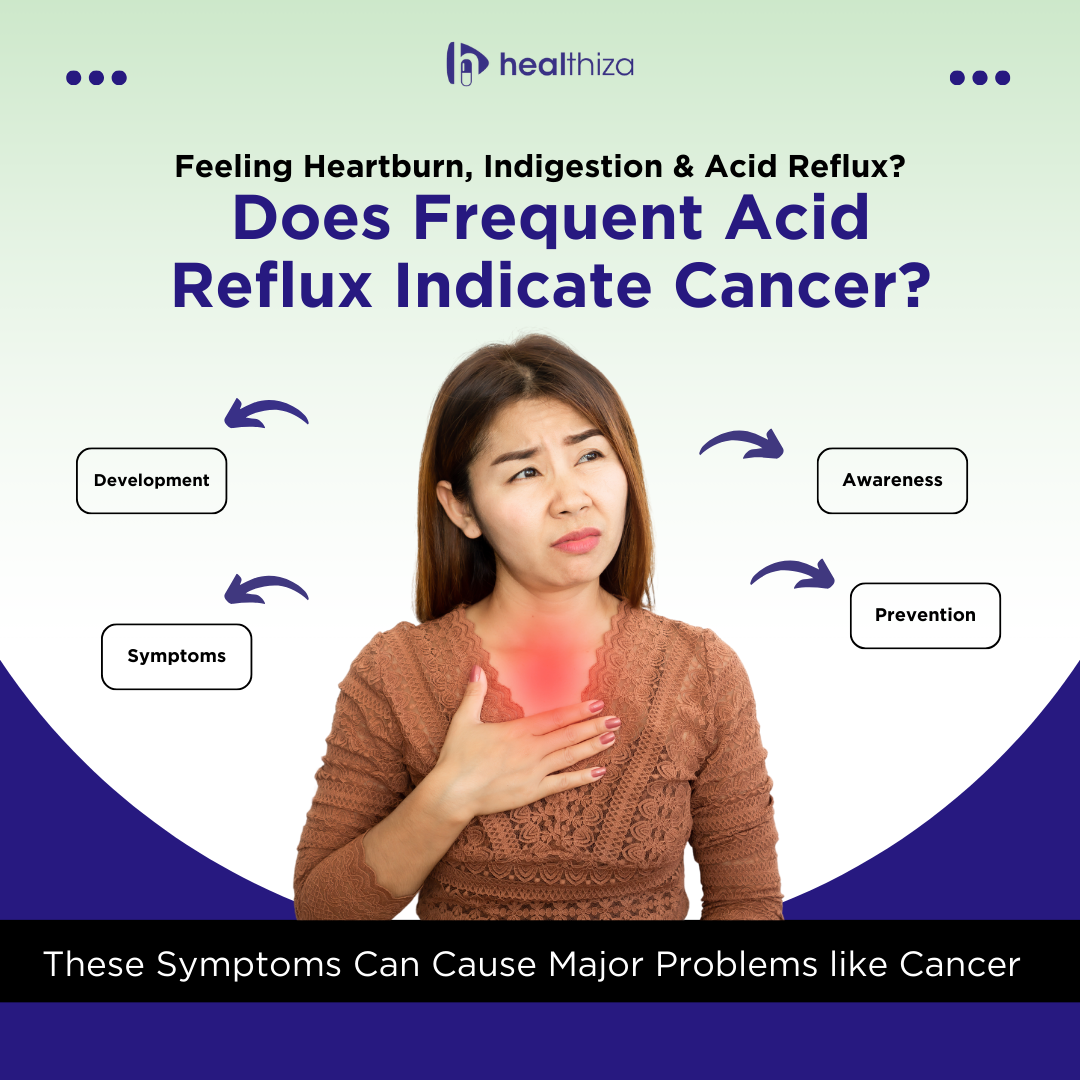What is Acid Reflux?
Unfortunately, many of us have experienced the uncomfortable symptoms of acid reflux, like heartburn, indigestion, and regurgitation. These sensations are likely causing more harm than just being a hassle.
The stomach’s contents rising back up into the oesophagus is known as acid reflux. The cells in the upper portion of the stomach and the lower portion of the oesophagus may be harmed by this gastric acid. The DNA may behave differently as a result of this damage to the cells, which could affect how the cells divide, grow, and die. This may therefore increase the likelihood that these cells may develop into cancer.
How Does it Develop?
Heartburn is so prevalent that practically everyone gets it; for most people, it is only a minor discomfort. This searing pain could indicate acid reflux, a condition in which stomach acid enters the oesophagus and irritates the lining of the oesophagus. This illness progresses to become gastroesophageal reflux disease (GERD) in millions of people.
Symptoms of GERD
A more severe and chronic form of gastric reflux is known as gastroesophageal reflux disease or GERD. It results in persistent symptoms like:
- Chronic heartburn
- Pain in the chest
- Nausea
- Difficulties swallowing
- Vomiting
- Appetite loss
- Loss of weight
- Persistent cough
- Sibilant voice
These symptoms can happen even if you don’t eat or drink, and if they aren’t treated with medicine and dietary, weight, and lifestyle modifications, they could eventually cause major problems.
Acid Reflux Can Cause Cancer
Stomach acid reflux, especially when it becomes chronic and severe, can potentially increase the risk of certain types of cancer. The most notable cancer associated with chronic acid reflux is oesophagal adenocarcinoma. This risk primarily arises from a condition called Barrett’s oesophagus, which can develop as a consequence of long-standing gastroesophageal reflux disease (GERD). You must consult a physician who has the knowledge, expertise, and experience to screen for Barrett’s oesophagus and create an immediate care plan if you have these symptoms.
Preventing Short Term Heartburn
You should consult your primary care physician if you occasionally get heartburn. Usually, your physician will advise you to:
- Eat nothing for three to four hours before going to bed.
- Make sure to chew your food well and consume it slowly. Stay away from foods that you know cause problems.
- Avoid falling asleep right away after eating. Keep your head up if you have to recline.
- Remove alcohol, nicotine, and caffeine.
- Avoid spending a lot of time lying down.
- Reduce your weight.
- Put on loose-fitting attire.
Patients with GERD are more prone to experience serious health issues, such as Barrett’s oesophagus and oesophagal cancer, and frequently are unaware that they are at higher risk.
Barrett’s oesophagus occurs when the normal lining of the oesophagus is replaced by tissue that is similar to the lining of the intestine. This change is believed to be a response to chronic irritation from stomach acid. People with Barrett’s oesophagus have an increased risk of developing oesophagal adenocarcinoma, a type of cancer that affects the lower part of the oesophagus.
Awareness of Risk Factors
It is essential to distinguish between the many types of indigestion, such as those caused by eating spicy meals or consuming excessive amounts of alcohol. Thus, how can a person determine whether they have acid reflux that can be treated or whether Barrett’s oesophagus is linked to a more serious condition?
Patients should be aware of the following risk factors because it can have varying effects on different people:
- Have you experienced acid reflux for longer than five years?
- Are (over-the-counter) OTC medications ineffective in treating acid reflux?
- Are you more than fifty years old?
- Are you a smoker?
- Do you have an obesity or overweight problem?
- Have you lost weight for an unexplained reason?
- Are you a male?
- Do you identify as Caucasian?
- Do you have difficulties swallowing liquids or solids?
If the answer to a combination of questions is yes, you may need to consult a doctor.
While the association between acid reflux and oesophagal adenocarcinoma is well-established, it’s important to note that not everyone with acid reflux develops Barrett’s oesophagus or cancer. Many factors can influence an individual’s risk, including the severity and duration of acid reflux, other lifestyle factors (such as smoking and obesity), and genetic predisposition.
Importance of Healthy Weight
It is important to understand that being overweight or obese raises the risk of acid reflux in the stomach and contributes to the risk of cardia stomach cancer, which is a type of cancer that develops at the top of the stomach where it meets the oesophagus, and oesophageal adenocarcinoma, which is a type of cancer that develops at the lower end of the oesophagus where it meets the stomach.
It is crucial to maintain a healthy weight in order to lower your risk of developing stomach cancer as well as oesophageal cancer. You can lower your chance of Colon Cancer, Breast Cancer (post-menopause), Gallbladder Cancer, Kidney Cancer, Liver Cancer, Ovarian Cancer, Advanced Prostate Cancer, Womb, and Pancreatic Cancers by maintaining a healthy weight.
Conclusion
If you experience frequent or severe acid reflux symptoms, it’s crucial to consult with a healthcare professional. They can provide proper diagnosis, monitoring, and treatment to manage your condition effectively and reduce the risk of complications, including cancer. Early detection and intervention can significantly improve outcomes for individuals with Barrett’s oesophagus or oesophagal adenocarcinoma.


